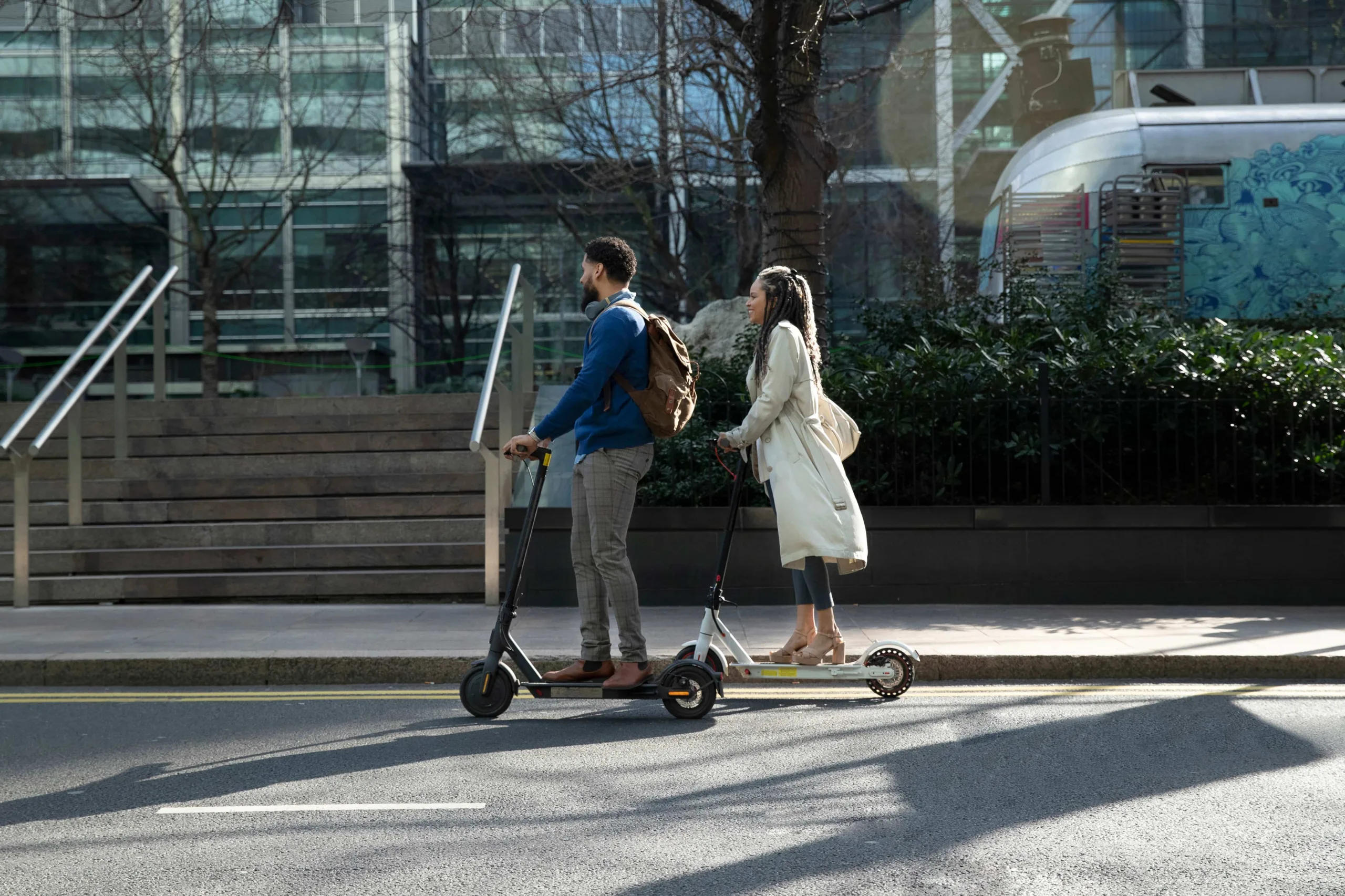Table of contents
- The Real Risk: E-Scooter Use Is Up, and So Are the Accidents
- Florida E-Scooter Laws: What Counts as an E-Scooter?
- Where Are E-Scooters Banned in Florida and Why?
- Common Causes and Injuries in E-Scooter Accidents
- Do You Need Insurance for a Scooter or E-Scooter in Florida?
- Who’s Liable in a E-Scooter Accident?
- What Damages Can You Claim After a Scooter Accident?
- Safety Tips for E-Scooter Rides That Can Save You
- Protect Yourself, and Know We’re Here if You’re Hurt
You’ve probably noticed e-scooters zipping through Florida streets and beach towns more than ever before. They’re quick, cheap, and fun, but with that rise in popularity has come a sharp increase in accidents and serious injuries. Before you hop on one, here’s what you need to know about the laws, the risks, and your rights if a ride goes wrong.
The Real Risk: E-Scooter Use Is Up, and So Are the Accidents
E-scooter use has exploded across the country and in Florida. Sales of personal scooters are climbing, and rental fleets in cities like Tampa, Miami, and Orlando make it easy for anyone to hop on and ride. But with that growth has come a sharp rise in crashes. The U.S. Consumer Product Safety Commission reported a 22% jump in e-scooter injuries in just one year, with nearly 57,000 riders ending up in the ER in 2022.
Here in Florida, the numbers and the stories behind them are alarming. A Tampa General Hospital study found that 41% of scooter crash victims suffered head injuries and nearly a third required hospital admission. Alcohol doubled the risk of serious trauma. In Key Biscayne, the tragic 2024 death of local tutor Megan Andrews in a scooter collision pushed lawmakers to finally give cities more power to regulate scooters by age. Just this year in St. Augustine, a helmetless juvenile suffered a severe head injury after falling from an e-scooter — one of multiple local accidents in the same week. Later, at HCA Florida Brandon Hospital, doctors say they are seeing a surge of children and teens with devastating head and neck injuries from scooter and e-bike crashes.
These aren’t rare, one-off events. They happen every weekend on Florida streets, sidewalks, and neighborhoods. Another problem is that Florida’s scooter rules aren’t simple, and what you can or can’t do depends on what you’re riding and where.
Florida E-Scooter Laws: What Counts as an E-Scooter?
Here’s where things get tricky. Under Florida law, e-scooters are defined as “micromobility devices” (Florida Statutes §316.003 & §316.2128). That means the state treats them more like bicycles than cars. For most electric scooters that top out under 20 mph, you don’t need a license, registration, or insurance to ride. You might ride an e-scooter in bike lanes, roads (if the local government allows), but at the same time, there are local bans on e-scooters in certain places.
The main difference, that a lot of riders get caught off guard; e-scooters are not treated the same as gas scooters. To clarify, here’s how Florida law categorizes these vehicles:
| Feature | E-Scooter (<20 mph, electric) | 49cc / 50cc Scooter (gas) | 150cc+ Scooter (motorcycle class) |
| Legal Category | Micromobility device (treated like a bicycle) | Motor scooter | Motorcycle |
| Title & Registration | Not required | Required | Required |
| License | None required | Driver’s license required (no motorcycle endorsement) | Motorcycle endorsement required |
| Insurance Required | None | None (but you’re financially responsible in a crash) | None at registration (but DMV may suspend license/plate after an injury crash unless you carry 3 years liability coverage) |
| Helmet Requirement | Required under 16 | Strongly recommended (not legally required for adults) | Required under 21; strongly recommended for all riders |
| Typical Speed | Up to 20 mph | 30–40 mph | 60+ mph |
But this is only part of the picture. The reality on the ground, that helmet laws, rental company rules, and city ordinances can change your ride entirely
If you’re under 16, you’re legally required to wear a helmet, riding an e-scooter, but in real life, helmet use is almost nonexistent. In fact, Tampa’s study showed that only 2% of injured riders had one on.
Rental companies add another layer of rules. The apps like Bird or Lime require you to be 18 to ride, and the terms you agree to with one quick tap often waive important legal rights if something goes wrong.
On top of that, cities across Florida can set their own restrictions. Some allow scooters in bike lanes, others ban them from sidewalks, and a few don’t allow them at all. This patchwork of rules leaves many riders confused, and that confusion shows up in accident cases. We often hear from these accident victims who say, “I thought I was riding legally,” only to find out the city ordinance said otherwise. That misunderstanding can impact how fault and liability are argued after a crash.
Accidents don’t care whether you knew the local rule or not, and then the law can suddenly feel stacked against you. And that’s why it’s important to know not only what the state says but also what your city allows.
Where Are E-Scooters Banned in Florida and Why?
Florida law says scooters are legal, but local governments get the final say on where they can and can’t be ridden. That’s why the rules change the moment you cross a city line. In places like Sanibel, Naples, and Fort Myers Beach, scooters are completely banned from public roads and sidewalks. City leaders there point to heavy tourist traffic, narrow streets, and past accidents as reasons to keep scooters off the roads entirely.
Other cities have put stricter limits in place instead of outright bans. Treasure Island, for example, doesn’t allow scooters on sidewalks and the beach itself, and caps speeds on its beach trail at 10 mph. St. Augustine uses “geofencing” technology to automatically cut power to scooters in certain historic plazas, where accidents with pedestrians have become a problem.
For riders, this patchwork of rules creates real risks. That can complicate liability, even if the accident was caused by a reckless driver or a defective scooter. The safest rule of thumb is this: if you see rental scooters in a city, personal scooters are usually allowed too. But never assume. A quick local check before you ride can make the difference between a legal trip and a citation that jeopardizes your case if an accident happens. And as we mentioned, these accidents happen far too often, and many of them lead to serious injuries.
Common Causes and Injuries in E-Scooter Accidents
Most electric scooter crashes aren’t “freak accidents.” They happen for the same reasons we see in car and motorcycle cases, but riders have even less protection when something goes wrong. One of the biggest dangers is collisions with cars. Drivers often don’t see scooters in traffic, especially at night or when a rider is in a bike lane. In fact, most fatal scooter accidents involve a motor vehicle.
Road conditions are another major factor. Potholes, uneven sidewalks, and loose gravel can stop a scooter’s small wheels cold, sending riders over the handlebars. Defective scooters add another layer of risk. Brakes that fail, throttles that stick, or batteries that catch fire have all been reported as well.
Then there’s rider behavior. In Tampa, almost 14% of scooter injury patients admitted to alcohol use before their crash, and those riders were twice as likely to suffer head trauma. Speeding, carrying passengers on a single scooter, or riding without lights after dark all raise the odds of an accident. Add in distracted riders looking at their phones, and the danger multiplies.
The injuries from these crashes are serious, especially for unprotected e-scooter drivers. Head injuries are the most common, often leading to concussions or traumatic brain injuries. Broken arms and wrists happen frequently because riders instinctively try to catch themselves during a fall. Spinal injuries, facial fractures, and dental damage are also common, and some crashes end in life-altering disabilities. Even what seems like a minor fall can leave you with long-term pain, costly rehab, and weeks or months of missed work.
Another big question comes up: what happens financially after a crash? That’s where insurance, or the lack of it, plays a huge role.
Do You Need Insurance for a Scooter or E-Scooter in Florida?
Most riders are surprised to learn that Florida does not require insurance for electric scooters under 20 mph. You can rent one, hop on, and ride with zero coverage in place. But when a crash happens, there’s no automatic protection. Your car insurance usually won’t help, and while health insurance (PIP) may cover ER bills, it won’t pay for lost income, long rehab, or pain and suffering. That leaves many injured riders on the hook for thousands of dollars. Gas-powered scooters work a little differently. A 49cc scooter or even a 150cc motorcycle-class scooter doesn’t need insurance to register.
But if you cause a crash with injuries, Florida’s financial responsibility law steps in. The DMV can suspend your license and registration until you prove you’ve carried liability insurance for three years.
The truth? Insurance isn’t mandatory for most scooters in Florida, but it can save your future. With policies starting around $75–$100 a year, basic liability coverage can mean the difference between walking away from an accident or facing crushing debt. And with e-scooter injuries sending tens of thousands to the ER every year, riding without protection is a real gamble.
That’s why, if an accident happens, it’s important to identify every liable party and explore all possible sources of compensation.
Who’s Liable in a E-Scooter Accident?
Unlike a simple car crash, these accidents often involve multiple parties pointing fingers. In e-scooter accidents, liability usually falls:
Other Drivers
The most common scenario is a driver hitting a scooter. Cars turning without checking bike lanes, speeding through intersections, or texting behind the wheel all put scooter riders in danger. In Florida, if a driver’s negligence caused the crash, their insurance should cover your injuries and losses. But insurers often fight these cases harder, arguing scooters are “too risky” and trying to minimize payouts.
City or County
Road conditions matter. A pothole, a broken sidewalk, or missing signage can turn a normal ride into an ambulance trip. Cities and counties are responsible for keeping roads reasonably safe, and when they fail, they can be held liable. These cases are tougher because government claims have short filing deadlines, but they’re often the only way to recover when poor maintenance causes the crash.
Scooter Companies
If you were on a Bird, Lime, or other rental scooter, the company may share fault. Brakes that don’t work, handlebars that snap, or scooters with dead lights are maintenance failures, not rider mistakes. Rental companies are aware of this issue, which is why their apps make require you to agree to pages of fine print before riding you ride.
Property Owners
Scooter accidents also happen on private property such as parking lots, apartment complexes, or shopping centers. If a hazard, such as a broken ramp or loose gravel, caused the crash, the property owner may be liable under premises liability law.
The Rider Themselves
Often, the e-scooter rider may be partially at fault, whether for riding while intoxicated, carrying a passenger, or using the scooter in a restricted area. But under Florida’s comparative negligence system, you may still be eligible for compensation if another party also played a role in causing the accident.
Injured Children
When kids are hurt in scooter crashes, liability often shifts to adults. A negligent driver who strikes a child rider can be held responsible, and scooter companies can face claims if they failed to prevent underage riders from accessing rentals. These cases are especially sensitive because the injuries can be severe and have lasting effects.
Once fault is established, the focus turns to what you can actually recover, and how to make sure your claim covers the full impact of the crash.
What Damages Can You Claim After a Scooter Accident?
The law gives you the right to pursue compensation, but how much you can claim, and from whom, depends on the details of your case.
If You’re Not at Fault
If you weren’t at fault in a scooter accident, you can pursue compensation for medical bills, lost wages, pain and suffering, property damage, and even long-term care costs. Claims can be made against the at-fault driver’s insurance, a city or county through a government claim, or even the scooter rental company if equipment failure played a role.
If You’re Partially at Fault
Florida follows comparative negligence, meaning you can still recover damages even if you share some of the blame. For example, suppose you weren’t wearing a helmet or were riding in a restricted area, but a distracted driver hit you. In that case, the court may reduce your compensation but not eliminate it entirely.
If You’re the At-Fault Rider
Even if you caused the accident, you still have options. Your health insurance may cover medical treatment, though it won’t replace lost income or compensate for pain and suffering. If you purchased liability coverage or medical payments insurance for your scooter, those policies could step in. Without coverage, though, you may end up responsible not only for your own expenses but also for damages to others.
Whether you’re at fault or not, the aftermath of a scooter accident is complex. Knowing what you can claim and how to claim it is critical to protecting your recovery and your future. However, prevention is always better than a lawsuit. A few safety habits can make all the difference.
Safety Tips for E-Scooter Rides That Can Save You
Scooters don’t offer the protection of a car, so every bit of prevention matters. A few simple habits can drastically lower your risk of a serious accident:
- Always wear a helmet. Even if you’re over 16 and not legally required, helmets prevent the most common and devastating injury: head trauma.
- Ride sober. Alcohol and drugs make crashes far more likely and injuries more severe. In Tampa’s data, intoxicated riders were twice as likely to suffer head injuries.
- Stick to bike lanes where allowed. Staying out of heavy car traffic gives drivers more room to see and avoid you.
- Don’t ride double. Scooters are designed for one person. Adding a passenger makes the vehicle unstable and increases the risk of injury.
- Avoid modifying your scooter. Kits that boost speed may seem fun, but they put you into motorcycle territory without the safety requirements or training.
- Make yourself visible. Use lights at night, wear bright clothing, and add reflective gear. Many crashes happen simply because drivers don’t see scooters until it’s too late.
- Check your scooter before you ride. Look at the brakes, tires, and throttle. A quick check can catch a defect that might otherwise cause a crash.
Moreover, Florida is a vacation hotspot, and if you’re visiting the state, renting a scooter feels like the easiest way to get around.The law allows it with a valid license from your home country and an International Driver’s Permit; you can legally ride here for up to one year. But knowing the local rules is critical. Tourists often hop on scooters in Miami, Orlando, or Key West without realizing that nearby areas such as Sanibel, Naples, or Fort Myers Beach have banned them completely. Riding in a restricted zone can lead to fines, and worse, it can complicate your ability to file a claim if you’re injured.
Taking these precautions won’t eliminate every risk, but they can make the difference between a safe ride and getting into a crash. Even with the best precautions, accidents still happen. And when they do, the aftermath can be overwhelming.
Protect Yourself, and Know We’re Here if You’re Hurt
Scooters may be everywhere in Florida, but so are the accidents. The laws are confusing, the insurance gaps are real, and riders are often left unprotected when the worst happens. One crash can mean head injuries, hospital bills, time off work, and months of recovery.
That’s where we come in. At Steinger, Greene & Feiner, we’ve handled e-scooter accident cases throughout Miami, Fort Lauderdale, West Palm Beach, Orlando, Tampa, and across the state. Our attorneys understand how these crashes happen and how Florida’s evolving e-scooter laws apply. We fight against rental companies, insurers, and negligent drivers who attempt to dodge accountability. With decades of experience behind us, we know how to build a case that gets you the compensation you deserve for both immediate costs and long-term recovery.
If you’ve been hurt in a scooter accident, don’t face it alone. Call us today for a free case review. We’ll stand in your corner from day one.





